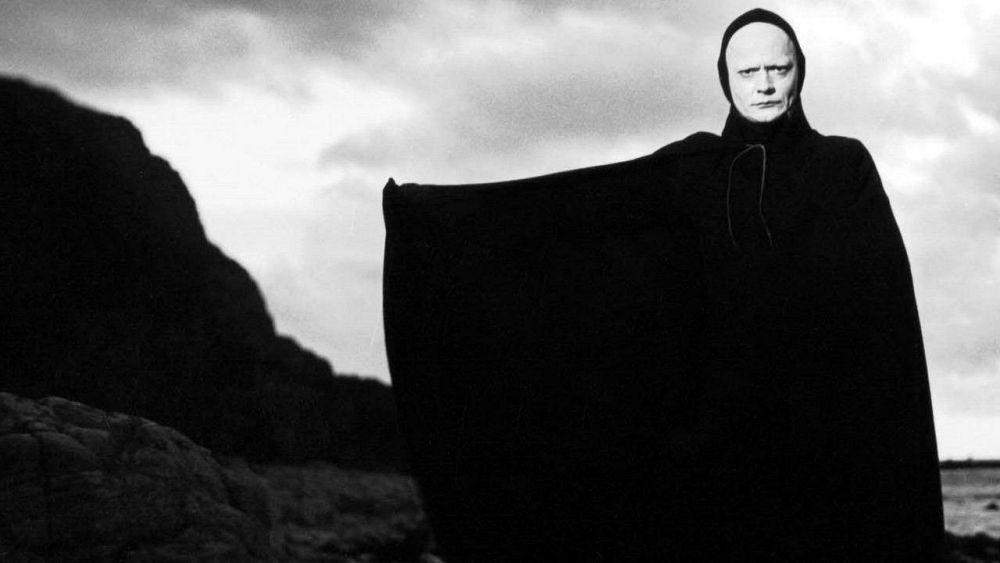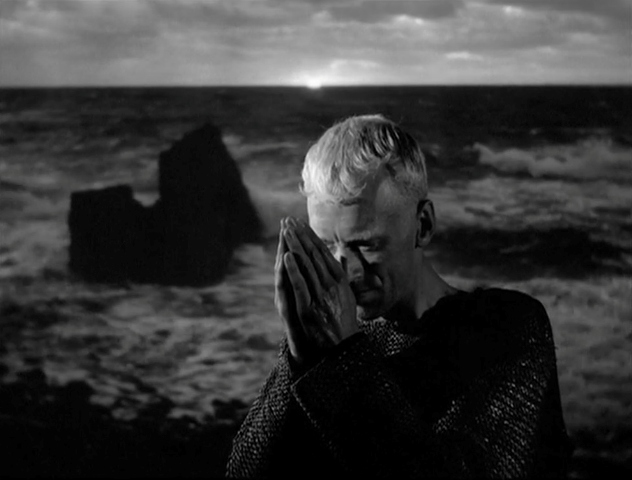by Chris Feil

The Seventh Seal begins with some of the most enigmatic and iconic imagery of Ingmar Bergman’s career. Which is saying something considering the auteur’s filmography is composed almost entirely of meditative frames. Here Max von Sydow's post-Crusades knight Antonious Block is visited by a black cloaked Death and the two take part in a literal and intellectual game of chess. It’s a grave way to start a film, one that still endures for its thematic impact and how it establishes the rest of its stark narrative as spiritually timeless.
Named for the passage in the Book of Revelation marking the final opening of the apocalyptic scrolls and the resulting period of silence in heaven, the film lives in that quiet Godlessness...
What follows that remarkable opening is a Canterbury Tales-esque meandering involving a troupe of actors and sinning villagers that Block encounters along his return home. It’s a road movie to an ideological nowhere, a reckoning with the unpredictability of the universe while humanity can always be expected to behave poorly. There’s no comfort to be found, but menace is in ourselves.
Similarly attuned to its musings, Bergman alternates between unexpected rueful humor and grim spiritual consequence. Moments of farcical interplay of the sexes are interrupted with the unsettling religious fervor of self-flagellation and burnings at the stake. The puerile is undercut with the profound. We as a species are a mess, but Bergman fabricates the the spiritual realm we inhabit as its own divinely structured shitshow. Balance in an immaculate chaos, not as it should be but as it is. And God isn’t listening, if God ever was.

While the film is emblematic of the dark night of the soul fascinations of most of Bergman’s career, it should be said that part of this film’s power is how oddly light the director’s hand feels when he’s being so visually exacting. The blend of casualness and severity is crucial to selling his vision.
Unlike other films with Orthodoxy on its mind, The Seventh Seal never feels all that mired in salvation or the afterlife. You could certainly suggest that Bergman is ambivalent about both. Even as it addresses sin and punishment, particularly for the adulterous and deceptive actor Skat, Death does not swing his judgment as a result. His tasks remain random, his purpose is in his neutral purposelessness. When God goes silent, the unfeeling world still spins on ever just as indiscriminately and without consequence. It’s a disquieting notion in times good and especially bad, made all the more unsettling by Bergman’s impenetrable visual aesthetic.
Because Death is initially not seen by the film’s other characters, they merely see Block playing opposite himself as he was before being greeted by Death in the opening moments. This posits his conversation (and Bergman’s, and ours) with mortality as a solitary one. One that we must bear, suffer, pontificate alone. The lasting impact of The Seventh Seal is how Bergman takes our personal wrestlings with the incorporeal and paints them as universally endured across the ages. The apocalypse is now and we poor souls are sitting around waiting for it.

More from The Film Experience's Bergman Centennial:
Sean Donovan on Winter Light
Daniel Walber's The Furniture on Fanny and Alexander
Lynn Lee on Persona